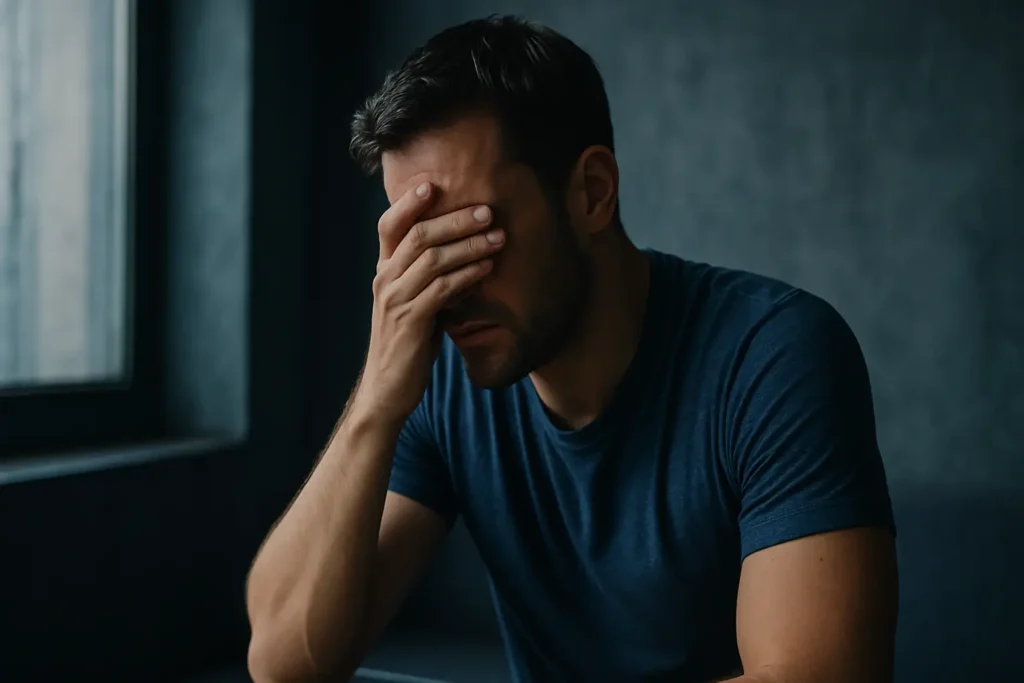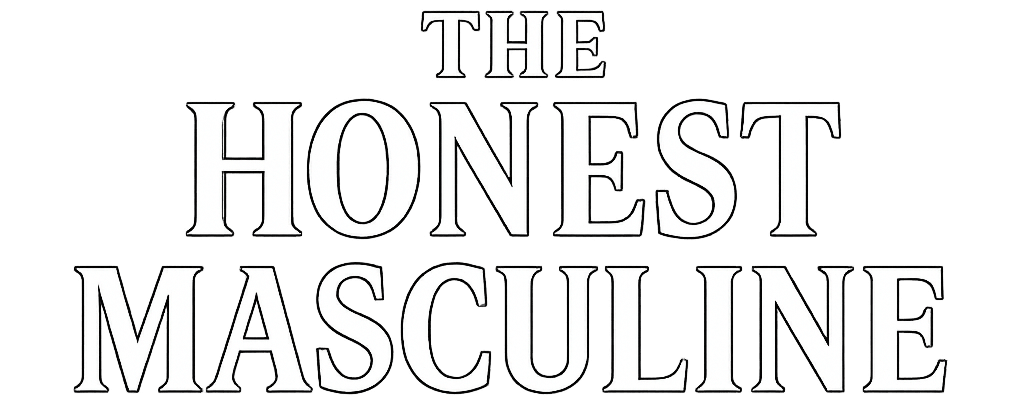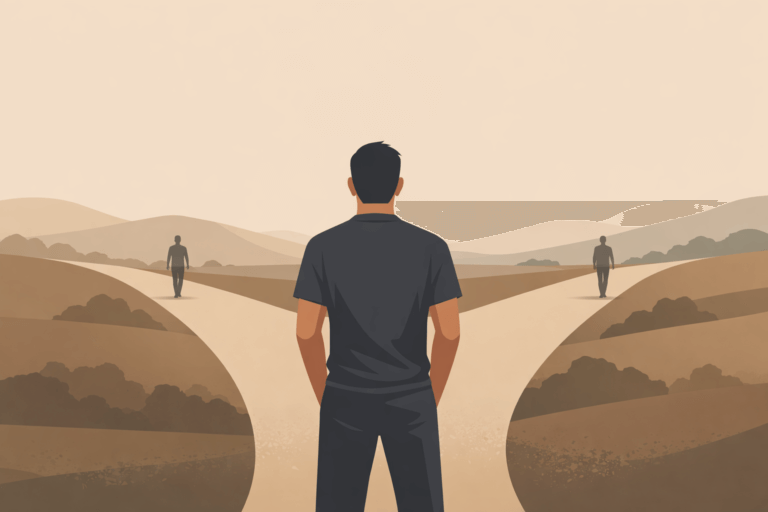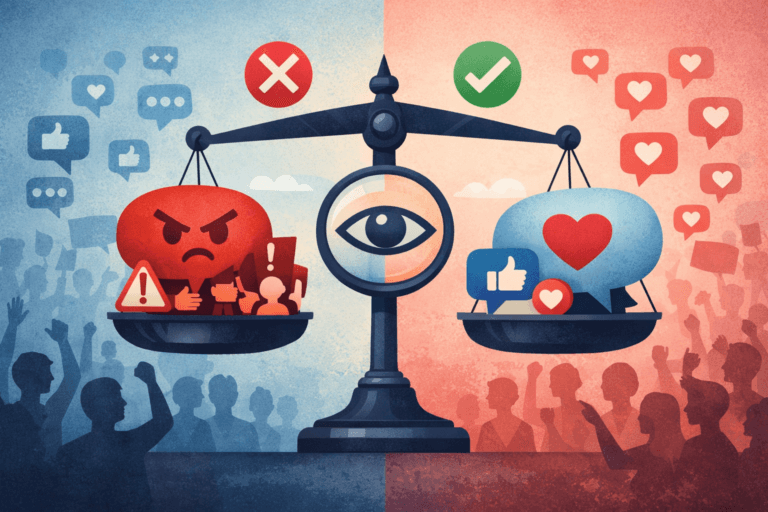
Table of Contents
Introduction: The Silent Drowning
Most men would rather drown quietly than admit they can’t swim.
That’s not a metaphor — it’s how we’re wired, or rather, how we’ve been conditioned. A man can be suffocating under bills, stuck in depression, or watching his marriage collapse, and he’ll still tell you he’s “fine.”
He’ll say it with a smile. He’ll say it with a beer in hand. He’ll say it even as the cracks in his life get wider and deeper.
Here’s the paradox: men are taught that asking for help makes them weak. But the refusal to ask is exactly what’s killing them.
Look at the numbers. Men are far less likely than women to seek therapy, but far more likely to commit suicide. They bottle everything up until it detonates — divorce, addiction, breakdowns, or an exit wound no one saw coming.
This isn’t just personal failure. It’s cultural. From the time we’re boys, we’re told:
- Don’t cry.
- Don’t complain.
- Don’t lean on anyone.
- Figure it out.
So men grow up thinking vulnerability is a sin, silence is strength, and drowning alone is noble.
But let’s call it what it is: a slow, silent suicide.
The Conditioning
From the time boys can walk, the rules are handed down:
- Don’t cry.
- Don’t whine.
- Don’t ask for help.
- Figure it out.
And if you break those rules? You’re mocked, shamed, or told you’re “not a real man.”
This conditioning is everywhere. Fathers who shut down emotion with a “man up.” Coaches who scream “don’t be soft.” Movies where the hero takes every bullet, every loss, and never needs saving. Society doesn’t teach boys that asking for help is human — it teaches them it’s humiliating.
So men learn to equate silence with strength. They think swallowing pain makes them tougher. They think ignoring their problems is heroic. By the time they hit adulthood, vulnerability isn’t just uncomfortable — it feels like betrayal.
Cultural Example:
Think about every “lone wolf” archetype in media — James Bond, Batman, Jack Reacher. Men are fed images of solitary heroes who solve everything alone, who never lean on anyone, who never admit weakness. Inspiring? Maybe. Realistic? Not even close.
And here’s the kicker: boys internalize this long before they understand it. The boy who falls on the playground and is told, “Stop crying, you’re fine,” grows into the man who hides depression behind a fake smile. The boy told to “figure it out yourself” becomes the man drowning in debt who won’t call a friend.
The conditioning is so deep that by adulthood, most men don’t even see asking for help as an option. They don’t consider it weakness — they consider it impossible.
The Cost of Silence
Silence doesn’t make men stronger. It makes them sick.
Look at the numbers:
- According to the CDC, men are 3.5x more likely to die by suicide than women.
- Divorce increases a man’s suicide risk by up to 250%.
- Men are far less likely to seek therapy or medical help, even when symptoms are severe.
It’s not because men feel no pain. It’s because they’ve been taught to bury it until it eats them alive.
You see it everywhere. The husband who drinks himself numb instead of admitting he’s unhappy. The father who explodes in anger at his kids because he never learned how to process stress. The middle-aged man who loses his job, smiles through it, and then quietly hangs himself in the garage.
These aren’t “weak” men. They’re men who were never given permission to be human.
Divorce Fallout:
A study from the University of California found that divorced men are more likely to suffer depression, substance abuse, and suicidal behavior compared to divorced women. Why? Women talk. Women seek help. Men don’t. They vanish into silence.
Financial Collapse:
When a man ties his identity to work and loses his job, it’s not just income he loses — it’s his sense of worth. Instead of calling a friend, a brother, or a counselor, he bottles it up. And that bottle eventually explodes.
Health Impact:
Even physically, silence kills. Men avoid doctors out of pride. By the time they seek help, their problems have advanced — heart disease, cancer, mental health breakdowns.
The cost of silence isn’t measured in bruised egos. It’s measured in funerals.
Why Men Fear Help
If silence is killing men, why don’t they just speak up? Because for most men, asking for help feels worse than drowning.
Here are the three fears that keep them quiet:
1. The Fear of Shame
Every man dreads being seen as weak. Asking for help feels like confessing failure.
The shame is baked in from boyhood: “real men handle their own problems.” By adulthood, leaning on someone feels like announcing you’ve failed the test of masculinity.
So instead of reaching out, men retreat into isolation. They’d rather suffer privately than risk humiliation.
2. The Fear of Rejection
“What if I ask, and nobody cares?”
That’s the thought running under the silence. Many men already feel invisible — to women, to society, sometimes even to their own families. The idea of reaching out and being ignored feels unbearable.
So they don’t ask. They pretend they’re fine, because the possibility of rejection seems worse than the pain itself.
3. The Fear of Exposure
Help means honesty. It means admitting the truth:
- “I’m addicted.”
- “I’m broke.”
- “My marriage is falling apart.”
- “I don’t know what I’m doing.”
And honesty strips away the mask. For a man who’s built his identity on looking confident, looking successful, looking “in control,” exposure feels like death.
The Irony:
What men fear most — shame, rejection, exposure — is actually what bonds humans together. Sharing struggle builds trust. Admitting weakness builds connection. But men are conditioned to see the cure as poison, so they avoid it until it’s too late.
And the result? Quiet suffering. Addictions nobody knows about. Marriages that look fine until they suddenly implode. Obituaries that shock everyone: “We had no idea he was struggling.”
Redefining Strength
Men have been lied to. We’ve been told strength is silence, that real men “handle it alone.” But here’s the truth: silence isn’t strength. It’s fear wearing a mask.
Real strength is admitting you don’t have it all figured out — and then doing something about it.
Think about it: a soldier isn’t weak for calling backup. A fighter isn’t weak for tapping out before he breaks his arm. A builder isn’t weak for asking another man to help carry the load. In each case, it’s the opposite — it’s intelligence, humility, and survival.
Brotherhood as the Antidote
Men need brotherhood the way lungs need oxygen. Isolation starves men. Brotherhood feeds them. When a man has brothers who won’t mock him for struggling, he finds the courage to ask for help.
This is why 12-step programs work. It’s why men’s groups are resurging. It’s why accountability partners change lives. Not because they make men softer, but because they remind men they’re not alone.
When a man stands in a circle of other men and admits, “I’m not okay,” something shifts. The shame dissolves. The mask drops. And in its place grows something deeper than fake confidence — trust, belonging, resilience.
Cultural Reframe:
We need to stop glorifying the lone wolf. Lone wolves starve. Packs survive. Men who refuse help don’t look heroic — they look like corpses waiting to happen.
True masculinity isn’t about carrying the heaviest weight alone. It’s about carrying it with others and still standing tall.
How to Actually Ask for Help
Telling men to “open up” isn’t enough. Most don’t know how. It feels awkward, foreign, even humiliating. So here’s a simple framework to make asking for help less terrifying and more effective:
1. Start Small
You don’t need to unload your deepest trauma in one conversation. Start with something simple.
- Ask a buddy for advice on finances.
- Admit to a brother that you’ve been slacking in the gym.
- Tell a friend you’re stressed instead of saying “I’m fine.”
Small asks build momentum. They teach your nervous system that vulnerability won’t kill you.
2. Be Specific
“Help me” is vague and overwhelming. Be clear about what you need.
- “Can you watch the kids for an hour so I can reset?”
- “I need someone to hold me accountable to hitting the gym.”
- “I’m stuck in debt — do you know someone I could talk to?”
Specific asks make it easier for others to show up.
3. Choose Your Circle Wisely
Not everyone deserves your vulnerability. Don’t dump your pain on people who mock, dismiss, or gossip. Choose men you respect, who respect you back, and who actually want to see you win.
If you don’t have those men yet? Find them. Join a men’s group. Build an accountability partnership. Brotherhood doesn’t magically appear — it’s built.
4. Practice Consistency, Not One-Offs
Asking for help once doesn’t change your life. Building a rhythm of honesty does.
Set a weekly check-in with a brother. Share your wins, your losses, your struggles. Over time, it becomes normal — not shameful.
5. Remember: Asking Is Strategy, Not Surrender
Think of it like this: no warrior goes to battle without backup. No athlete trains without a coach. No empire was built by one man.
Asking for help isn’t waving a white flag. It’s sharpening your blade by using every resource available to you.
Practical Example:
A man I worked with was drowning in debt. He hid it from his wife, his friends, everyone. Shame ate him alive. Finally, he broke and told a close friend. That friend connected him to a financial advisor who laid out a plan. Within a year, he was on his way out of the hole. He wasn’t weak for asking. He was smart. His silence nearly ruined him. His honesty saved him.
The Truth Bomb
Men aren’t weak for asking for help. They’re weak for dying in silence.
Silence isn’t strength. It’s cowardice disguised as pride. It’s the slow drip of poison that rots men from the inside out. And it’s killing us — in garages, in hospital beds, in lonely apartments where nobody knows what’s really going on.
The truth is this: asking for help isn’t surrender. It’s strategy. It’s courage. It’s the decision to stop pretending you’ve got it all handled and actually do something about it.
Because here’s the reality — no man has ever truly done it alone. The soldiers we admire fought in platoons. The builders of civilizations worked in tribes. Even the toughest athletes have coaches, teammates, and trainers. The lone wolf myth is exactly that — a myth.
So stop polishing the mask. Stop pretending silence makes you stronger. Stop convincing yourself that drowning quietly is noble. It’s not. It’s cowardly.
The world doesn’t need another man who suffers in secret until he breaks. The world needs men brave enough to stand up and say, “I can’t do this alone.”
That’s not weakness. That’s strength.
If this hit you, don’t just scroll away and pretend you’re fine. Start now.
👉 Download The Masculine Reset: 7 Uncomfortable Truths That Will Set You Free
👉Want to reclaim your life?
Join My Newsletter The Honest Masculine weekly newsletter — and you’ll get instant access to my (The Masculine Comeback: A 7-Day Reset for Men Who Feel Lost). No fluff, no filters. Just raw truths about breakups, masculinity, fatherhood, and the quiet battles men face alone.
It’s for the man who’s done pretending.




[…] Lie — men are trained to measure themselves by fragile standards. Then, when divorce hits (Why Men Don’t Ask for Help — Even When They’re Drowning ) or a career crumbles (How Divorce and Job Loss Shatter Male Identity ), their entire foundation […]
No, articles like this, that hurl judgement and condemnation on men for being afraid of the ‘help’ that finishes the sentence “I’m from the government and I’m here to help.” and then tells them to not feel judgement or condemnation from those who offer judgement and condemnation as ‘help’ are the reason why men don’t seek such ‘help.’ Completely missing the point, ignoring what has changed for men and then pathologizing what hasn’t changed, is the reason men don’t seek help. The problem is not that men do ‘t seek help, it’s that they shouldn’t need it, haven’t needed it until recently, and shouldn’t be expected to seek it from those who are causing their suffering. Men are too stubborn to buy the solutions being sold by the ones who made the problems to begin with.